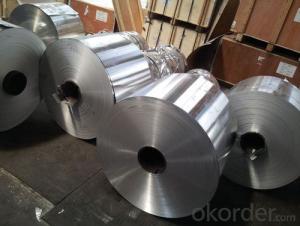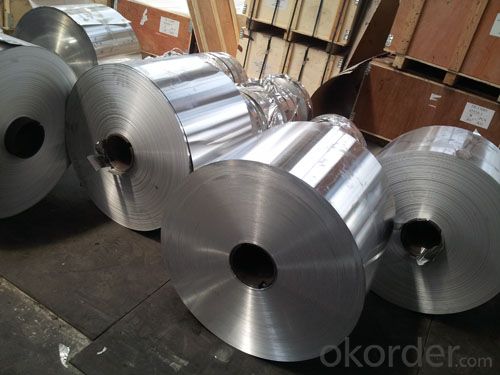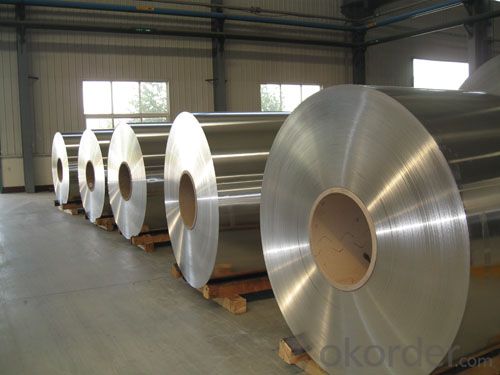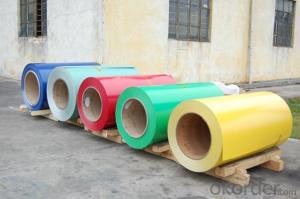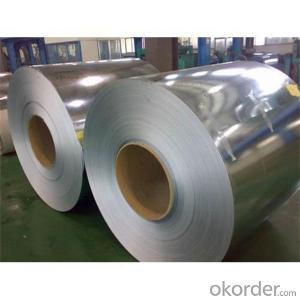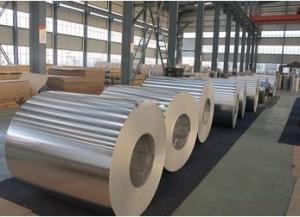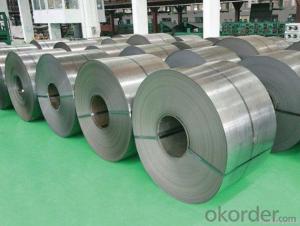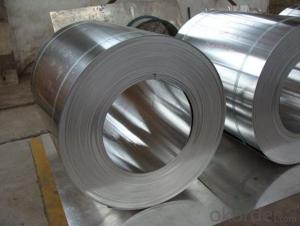1050 Aluminum Coil for Sale - Coated Aluminum Coil/Roll for Aluminium Furniture
- Loading Port:
- Shanghai
- Payment Terms:
- TT OR LC
- Min Order Qty:
- 2 m.t.
- Supply Capability:
- 50000 m.t./month
OKorder Service Pledge
OKorder Financial Service
You Might Also Like
Specification
Coated Aluminium Coil/Roll For Aluminium Fuiniture
Description
Alloy | 1060, 1100, 3003, 8011, etc. |
Temper | H16, H18, H24, H26, H28 |
Thickness | From 0.05mm to 3.0mm |
Width | Standard width:1240mm |
Special width:1300mm, 1520mm, 1570mm, 1595mm | |
Diameter | Standard dia:1200mm |
Interior dia:150mm,405mm,505mm | |
Weight | 2.5 T/coil,3.0 T/coil |
Coating | PE, PVDF, ACRYLIC |
Surface | Embossed, mill finish, coated |
Color | AS to code RAL |
Gloss | 10-90%(EN ISO-2813:1994) |
Coating Thickness | PE: more than 18 micron |
PVDF: more than 25 micron | |
Coating Hardness(pencil resistance) | More than 2h |
Coating adhesion | 5J (EN ISO-2409:1994) |
Impact Resistance | No peeling or cracking(50 kg/cm,ASTMD-2794:1993) |
Flexibility(T-bend) | 2T |
MEK resistance | More than 100 |
Advantage | 1.High temperature resistant 2.Weathering resistant 3.Scrubbing resistant 5.Acid or alkali proof 6. Fireproof 7.Light weight material is easy to construct and install |
Out package | Wooden splint with export standard |
Application | ACP, wall cladding, facades, roofs and canopies, ceilings, signboards, blind window, display platforms, electrical panels, etc |
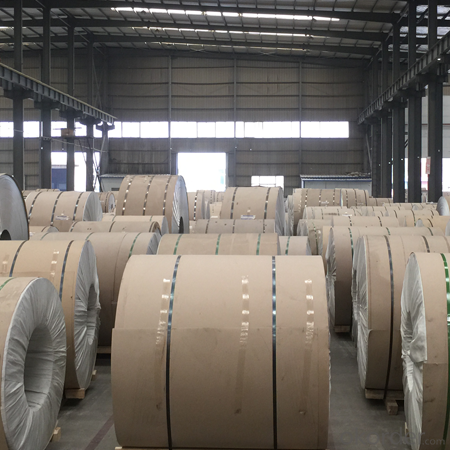
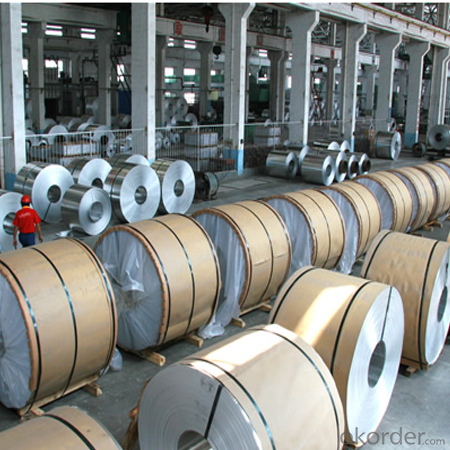
Manufacturing
Decoiler → Accumulator →Tension Leveler →Acid & Alkali Cleaner → Rinse →Conversion Treatment → Priming coater →Infrared Curing Oven →Main coater →Floatation Curing Oven →Strippable Film Applicator → Exit Accumulator → Recoiler
FAQ
--Q: Do you provide free samples?
--A: Yes, free samples will be sent to you on freight at destination.
--Q: Can I get your latest products catalogue?
--A: Yes, it will be sent to you in no time.
--Q: What is the MOQ?
--A: 2 tons
--Q: What are your payment terms?
--A: We accept L/C, T/T.
--Q: What kinds of alloy can you supply?
--A: 1000 series: 1050, 1060, 1070, 1100, 1145, 1200
3000 series: 3003, 3004, 3105, 3104
5000 series: 5052, 5083, 5754, 5182
6000 series: 6061, 6063, 6062, 6063
8000 series: 8011, 8021
--Q: What kinds of temper can you supply?
--A: O-H112: O,H12,H14,H16,H18,H22,H24,H26,H,32,H34,H111,H112
T3, T4, T6
- Q: Are aluminum coils suitable for decorative applications?
- Yes, aluminum coils are suitable for decorative applications. Aluminum is highly malleable and can be easily shaped into various designs, making it a popular choice for decorative purposes. Additionally, aluminum is resistant to corrosion, lightweight, and has a natural sheen, which adds to its aesthetic appeal. Its versatility, durability, and availability in different colors and finishes make it an excellent material for decorative applications in various industries such as architecture, interior design, and automotive.
- Q: Are there any limitations to the coil weight of aluminum coils?
- Yes, there are limitations to the coil weight of aluminum coils. The weight of aluminum coils is typically limited by factors such as the capacity of the equipment used for transportation or processing, the strength and stability of the packaging materials, and the safety regulations imposed by the industry. Exceeding these limitations can lead to difficulties in handling, increased risk of damage or accidents, and may impact the overall efficiency of the manufacturing or distribution process.
- Q: What is the typical heat transfer coefficient for aluminum coils?
- The heat transfer coefficient for aluminum coils can vary depending on several factors, including the application, coil geometry, and surrounding conditions. Generally, aluminum has high thermal conductivity, which enables efficient heat conduction. In forced convection applications, where heat is transferred using a fluid like air or water, the heat transfer coefficient for aluminum coils can range from 10 to 100 W/m^2K. This range is influenced by factors such as flow rate, velocity, and temperature difference between the coil and the fluid. In natural convection scenarios, where heat transfer occurs due to the buoyancy-driven flow of air, the heat transfer coefficient for aluminum coils is typically lower, ranging from 5 to 25 W/m^2K. This is because the movement of air is slower and the heat transfer effectiveness is reduced compared to forced convection. It's important to note that these values are general guidelines and can vary significantly depending on specific design considerations, material properties, and operating conditions. Therefore, it is recommended to consult specific heat transfer data or conduct detailed experiments or simulations to determine the precise heat transfer coefficient for a given aluminum coil application.
- Q: How are aluminum coils stored to prevent damage?
- Aluminum coils are typically stored in a clean, dry, and well-ventilated area to prevent damage. They are often stacked horizontally or vertically on pallets or racks to ensure stability and avoid bending or deformation. Additionally, protective coverings or packaging materials such as plastic wraps or cardboard boxes may be used to shield the coils from moisture, dust, and other potential sources of damage.
- Q: How are aluminum coils tested for strength and durability?
- Aluminum coils are tested for strength and durability through a rigorous process that involves several methods. One common method is tensile testing, which measures the maximum amount of stress a coil can withstand before it breaks or deforms. This test helps determine the overall strength and elasticity of the aluminum. Another important test is the hardness test, which measures the resistance of the aluminum coil to indentation or scratching. This test helps determine the durability and wear resistance of the material. Furthermore, aluminum coils are often subjected to fatigue testing, where the material is repeatedly subjected to cyclic loading and unloading. This test helps simulate real-life conditions and assesses the coil's ability to withstand repeated stress without failure. Additionally, corrosion resistance is a critical factor in determining the durability of aluminum coils. Therefore, various corrosion tests are conducted, such as salt spray testing, to assess the coil's resistance to environmental factors that may lead to corrosion or degradation over time. In some cases, non-destructive testing methods like ultrasonic testing or eddy current testing are employed to detect any internal defects or inconsistencies within the coil that may affect its strength and durability. Overall, a combination of mechanical, physical, and chemical tests are conducted on aluminum coils to ensure they meet the required strength and durability standards. These tests help manufacturers and consumers have confidence in the quality and reliability of the aluminum coils for various applications.
- Q: Can aluminum coils be painted or coated for aesthetic purposes?
- Yes, aluminum coils can be painted or coated for aesthetic purposes. This process involves applying a suitable paint or coating to the surface of the coils to enhance their appearance and provide protection against corrosion or other environmental factors.
- Q: What is the thickness tolerance of aluminum coils?
- The thickness tolerance of aluminum coils varies depending on the grade and manufacturing process. Typically, aluminum coils have a standard thickness tolerance of approximately +/- 0.005 inches (+/- 0.13 mm). However, it is important to note that this tolerance can be further adjusted or refined based on the specific requirements of the customer and the capabilities of the manufacturer. Certain specialized aluminum coil manufacturers may offer even tighter thickness tolerances, usually around +/- 0.002 inches (+/- 0.05 mm), to cater to more precise or demanding applications. To ensure the desired thickness tolerance is met for a specific project or application, it is always recommended to consult with the manufacturer or supplier.
- Q: How are aluminum coils coated for corrosion resistance?
- Aluminum coils are coated for corrosion resistance through a process known as coil coating. This involves applying a protective coating onto the surface of the aluminum coils to prevent oxidation and corrosion. The coating is typically a combination of primer and topcoat that is applied using various methods such as coil coating lines or spray applications. The coating acts as a barrier, protecting the aluminum from environmental factors such as moisture, chemicals, and UV radiation, thereby enhancing its durability and extending its lifespan.
- Q: What are the environmental benefits of using aluminum coils?
- There are several environmental benefits of using aluminum coils. Firstly, aluminum is a highly sustainable material. It is one of the most abundant elements on Earth and can be easily extracted from bauxite ore. Unlike other metals, aluminum can be recycled indefinitely without losing its physical properties. This means that using aluminum coils helps reduce the demand for extracting new resources and minimizes the environmental impact of mining activities. Secondly, aluminum is lightweight, which makes it more energy-efficient during transportation. Its low weight reduces fuel consumption and greenhouse gas emissions associated with shipping and logistics. Additionally, aluminum coils can be easily formed and shaped, which allows for efficient packaging and reduces the need for excess materials. Furthermore, aluminum has excellent thermal conductivity properties. This means that aluminum coils can efficiently transfer heat, resulting in more energy-efficient heating and cooling systems. By using aluminum coils in HVAC systems or heat exchangers, energy consumption can be reduced, leading to lower carbon dioxide emissions and a smaller carbon footprint. Additionally, aluminum is highly resistant to corrosion and can withstand harsh weather conditions. This durability ensures a longer lifespan for aluminum coils, reducing the need for frequent replacements and minimizing waste generation. Lastly, aluminum is non-toxic and poses no threat to human health or the environment. It does not release harmful substances or pollutants during its production or use. This makes aluminum coils a safe and environmentally-friendly choice for various applications. In summary, the environmental benefits of using aluminum coils include its sustainability, recyclability, lightweight nature, energy efficiency, durability, and non-toxicity. By opting for aluminum coils, we can contribute to resource conservation, energy savings, and a healthier planet.
- Q: How do aluminum coils perform in corrosive environments?
- Due to their inherent properties and protective coatings, aluminum coils exhibit exceptional performance in corrosive environments. When exposed to air, aluminum forms a natural oxide layer on its surface, which acts as a protective barrier against corrosion. This oxide layer displays high resistance to various corrosive agents, including saltwater, acids, and atmospheric pollutants. Moreover, aluminum coils can receive additional protection through diverse coatings and treatments, further enhancing their resistance to corrosion. These protective coatings can be organic, such as paint or lacquer, or inorganic, like anodizing or chemical conversion coatings. The combination of aluminum's natural oxide layer and supplementary protective coatings makes aluminum coils highly reliable and durable in corrosive environments. This corrosion resistance is especially advantageous in industries such as marine, chemical processing, and coastal applications, where exposure to saltwater or aggressive chemicals is commonplace. In addition, aluminum coils are lightweight, contributing to their versatility and ease of installation, making them suitable for a wide range of corrosive environments. This lightweight property also aids in reducing transportation costs and energy consumption during the installation process. In conclusion, aluminum coils are well-suited for corrosive environments due to their inherent corrosion resistance and the availability of protective coatings. Their durability, lightweight nature, and resistance to corrosion make them the ideal choice for numerous industries and applications, where longevity and performance are essential considerations.
Send your message to us
1050 Aluminum Coil for Sale - Coated Aluminum Coil/Roll for Aluminium Furniture
- Loading Port:
- Shanghai
- Payment Terms:
- TT OR LC
- Min Order Qty:
- 2 m.t.
- Supply Capability:
- 50000 m.t./month
OKorder Service Pledge
OKorder Financial Service
Similar products
Hot products
Hot Searches
Related keywords
